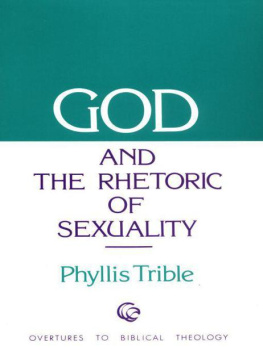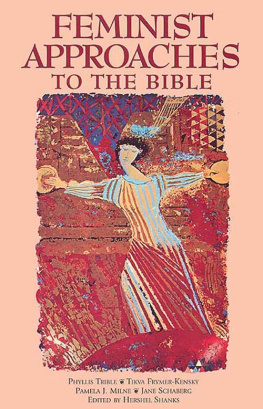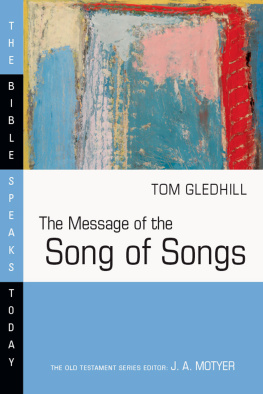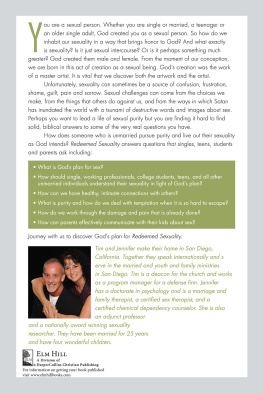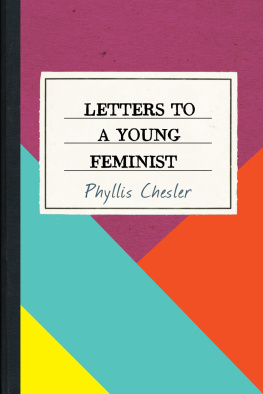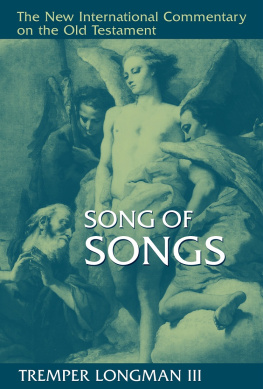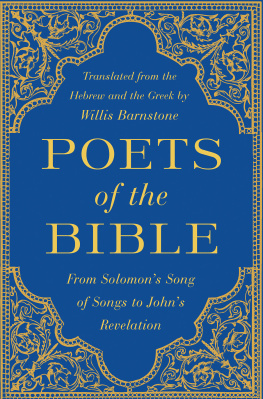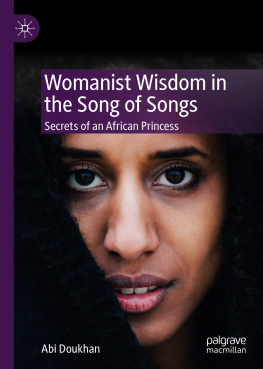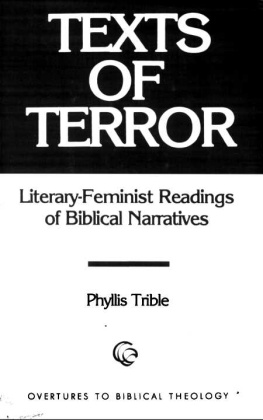Table of Contents
OVERTURES TO BIBLICAL THEOLOGY
The Land by Walter Brueggemann
God and the Rhetoric of Sexuality by Phyllis Trible
Texts of Terror by Phyllis Trible
The Suffering of God by Terence E. Fretheim
The Old Testament of the Old Testament by R. W. L. Moberly
Ministry in the New Testament by David L. Bartlett
Deuteronomy and the Death of Moses by Dennis T. Olson
Prayer in the Hebrew Bible by Samuel E. Balentine
A Theology of the Cross by Charles B. Cousar
The Collapse of History by Leo G. Perdue
Prayer in the New Testament by Oscar Cullmann
From Creation to New Creation by Bernhard W. Anderson
Canon and Theology, by Rolf Rendtorff
The Land Is Mine by Norman C. Habel
Battered Love by Renita C. Weems
Editors
WALTER BRUEGGEMANN, McPheeters Professor of Old Testament, Columbia Theological Seminary, Decatur, Georgia
JOHN R. DONAHUE, S. J., Professor of New Testament, Jesuit School of Theology at Berkeley, California
SHARYN DOWD, Professor of New Testament, Lexington Theological Seminary, Lexington, Kentucky
CHRISTOPHER R. SEITZ, Associate Professor of Old Testament, Yale Divinity School, New Haven, Connecticut
Biblical quotations from the Revised Standard Version of the Bible, copyrighted 1946, 1952, 1971, 1973 by the Division of Christian Education of the National Council of the Churches of Christ in the U.S.A., are used by permission.
Chapter 6 is an expanded version of Two Women in a Mans World: A Reading of the Book of Ruth, by Phyllis Trible, previously published in Soundings 59 (Fall 1976): 25179. Copyright 1976, The Society for Religion in Higher Education and Vanderbilt University. Used by permission.
A portion of Chapter 2 is a revision of The Gift of a Poem: A Rhetorical Study of Jeremiah 81:1522, by Phyllis Trible, previously published in Andover Newton Quarterly, March 1977, pp. 27180. Copyright 1977, Andover Newton Theological School. Used by permission. Portions of Chapter 4 were originally published as Eve and Adam, Genesis 23 Reread in Andover Newton Quarterly, March 1973, pp. 25158. Copyright 1973, Andover Newton Theological School. Used by permission.
Portions of Chapters 4 and 5 were originally published as Depatriarchalizing in Biblical Interpretation in Journal of the American Academy of Religion, March 1973, pp. 3048. Copyright 1973, American Academy of Religion.
COPYRIGHT 1978 BY FORTRESS PRESS
All rights reserved. No part of this publication may be reproduced, stored in a retrieval system, or transmitted in any form or by any means, electronic, mechanical, photocopying, recording, or otherwise, without the prior permission of the copyright owner.
Library of Congress Cataloging in Publication Data
Trible, Phyllis.
God and the rhetoric of sexuality. (Overtures to Biblical theology)
Includes index.
1. Bible. O.T.Criticism, interpretation, etc.
2. GodBiblical teaching. 3. Bible. O.T.Hermeneutics.
4. Image of GodBiblical teaching. 5. Sex (Theology)Biblical teaching. I. Title. II. Series. BS1171.2.T74 221.6 77-78647
ISBN 0-8006-0464-4
Printed in the United States of America 1-464
00 12 13 14 15 16 17 18 19
in memoriam
JAMES MUILENBURG
Series Foreword
Biblical theology has been a significant part of modern study of the Jewish and Christian Scriptures. Prior to the ascendancy of historical criticism of the Bible in the nineteenth century, biblical theology was subordinated to the dogmatic concerns of the churches, and the Bible too often provided a storehouse of rigid proof texts. When biblical theology was cut loose from its moorings to dogmatic theology to become an enterprise seeking its own methods and categories, attention was directed to what the Bible itself had to say. A dogmatic concern was replaced by an historical one so that biblical theology was understood as an investigation of what was believed by different communities in different situations. By the end of the nineteenth century biblical theology was virtually equated with the history of the religion of the authors who produced biblical documents or of the communities which used them.
While these earlier perspectives have become more refined and sophisticated, they still describe the parameters of what is done in the name of biblical theologymoving somewhere between the normative statements of dogmatic theology and the descriptive concerns of the history of religions. Th. Vriezen, in his An Outline of Old Testament Theology (Dutch, 1949; ET, 1958), sought to combine these concerns by devoting the first half of his book to historical considerations and the second half to theological themes. But even that effort did not break out of the stalemate of categories. In more recent times Old Testament theology has been dominated by two paradigmatic works. In his Theology of the Old Testament (German, 193339; ET, 1967) W. Eichrodt has provided a comprehensive statement around fixed categories which reflect classical dogmatic interests, although the centrality of covenant in his work reflects the Bibles own categories. By contrast, G. von Rad in his Old Testament Theology (German, 1960; ET, 1965) has presented a study of theological traditions with a primary concern for the historical dynamism of the traditions. In the case of New Testament theology, historical and theological concerns are rather roughly juxtaposed in the work of A. Richardson, An Introduction to the Theology of the New Testament. As in the case of the Old Testament there are two major options or presentations which dominate in New Testament studies. The history-of-religion school has left its mark on the magisterial work of R. Bultmann, who proceeds from an explanation of the expressions of faith of the earliest communities and their theologians to a statement of how their understanding of existence under faith speaks to us today. The works of O. Cullmann and W. G. Kmmel are clear New Testament statements of Heilsgeschichte under the aegis of the tension between promise and fulfillmentcategories reminiscent of von Rad.
As recently as 1962, K. Stendahl again underscored the tension between historical description and normative meaning by assigning to the biblical theologian the task of describing what the Bible meant, not what it means or how it can have meaning. However, this objectivity of historical description is too often found to be a mirror of the observers hidden preunderstanding, and the adequacy of historical description is contingent on one generations discoveries and postulates. Also, the yearning and expectation of believers and would-be believers will not let biblical theology rest with the descriptive task alone. The growing strength of Evangelical Protestantism and the expanding phenomenon of charismatic Catholicism are but vocal reminders that people seek in the Bible a source of alternative value systems. By its own character and by the place it occupies in our culture the Bible will not rest easy as merely an historical artifact.
Thus it seems a fitting time to make overtures concerning biblical theology. It is not a time for massive tomes which claim too much. It appears not even to be a time for firm conclusions which are too comprehensive. It is a time for pursuit of fresh hints, for exploration of new intuitions which may reach beyond old conclusions, set categories, and conventional methods. The books in this series are concerned not only with what is seen and heard, with what the Bible said, but also with what the Bible says and the ways in which seeing and hearing are done.

